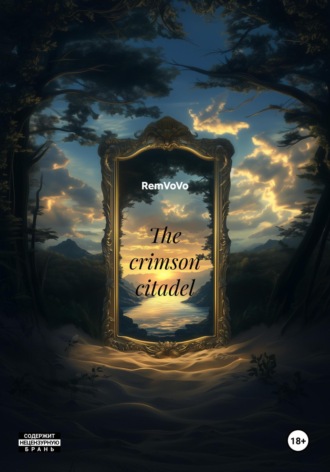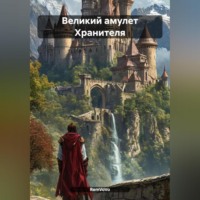
Полная версия
The crimson citadel

RemVoVo
The crimson citadel
Chapter 1: The Fracture
The world had always been a study in shades of grey for Elara Vayne, but tonight, the grey felt particularly suffocating. It was the grey of the rain-slicked asphalt eleven stories below her apartment window, the grey of the endless, unremarkable skyline of a city whose name she’d long stopped caring about, the grey of the silence that pressed in on her from all sides. It was the grey of a life that felt like a waiting room for something that was never going to happen.
She traced a finger through the condensation on the cool glass, her reflection a ghostly imprint over the neon sign of the all-night laundromat across the street. High cheekbones, a mouth that naturally settled into a disapproving line, eyes the color of dark smoke that missed nothing and found little to appreciate. She was beautiful, in a sharp, unforgiving way, like a shard of obsidian. People told her that, sometimes, with a tone that hovered between admiration and a warning. It had never done her any good. Beauty like hers was a fortress, not an invitation. It kept people at a distance, and after twenty-two years, Elara had decided that was precisely its purpose.
With a sigh that was more of a controlled release of breath, she turned from the window. The apartment was a monument to minimalist indifference. A sofa, a bookshelf crammed with dense, philosophical texts and dog-eared fantasy novels—her only true escape—and a single, struggling succulent on the windowsill she kept forgetting to water. It was a place to exist, not to live. The silence was a physical presence, broken only by the low hum of the refrigerator and the distant, rhythmic swish of a car through a puddle.
She picked up a book from the coffee table, its cover depicting a knight battling a creature of shadow and flame. It was comfort food for the soul, a predictable narrative of good and evil, of chosen ones and destiny. It was so much simpler than the ambiguous, disappointing reality of rent payments and grocery runs and the hollow ache of a Friday night spent utterly alone.
This is it, she thought, the familiar, cynical voice in her head chiming in. The thrilling culmination of another week. Should I make tea? Scroll through mindless feeds filled with people living lives more vibrant than mine? Perhaps I should just stand here until I fossilize. At least then I’d be interesting.
Her pride, a constant, simmering flame in her chest, bristled at the self-pity. She was Elara Vayne. She was smarter than this, sharper than this city, more deserving than this… nothingness. But deserving of what? That was the question that had haunted her since she could form coherent thoughts. There was a restlessness in her bones, a feeling of profound misplacement, as if she’d been born on the wrong planet, into the wrong story.
A flicker of light caught her eye. She turned back to the window. The sky, perpetually bleached by light pollution, was doing something strange. The ambient orange glow was deepening, shifting to a bruised, unnatural purple. The stars, normally invisible, weren't appearing. Instead, the darkness seemed to be thickening, congealing.
A low thrum, a frequency felt more in the teeth than heard by the ears, began to vibrate through the floorboards. The succulent on the windowsill trembled. Elara’s heart gave a single, hard knock against her ribs. This wasn’t right. This wasn't a thunderstorm.
She watched, frozen, as the moon—a pale, insignificant sliver—was slowly devoured. This wasn't a gradual astronomical eclipse. It was violent. A blot of absolute blackness slithered across its face, consuming it in seconds, leaving a hole in the sky. A perfect circle of void.
The thrumming intensified. The glass in the windowpane began to vibrate in its frame, emitting a high-pitched whine. The light from the streetlamps below didn’t just go out; it was extinguished, the darkness swallowing it whole as it rushed upwards, enveloping the building.
Panic, cold and sharp, finally pierced through her numb astonishment. She stumbled back from the window, her breath catching in her throat. The air grew frigid, her exhales forming plumes of mist in the suddenly arctic room. Shadows, once static and mundane, began to writhe. The shadow of the bookshelf elongated, stretching across the floor like a grasping hand. The shadow of the struggling succulent twisted into something thorny and malicious.
This isn’t happening. This is stress. A hallucination. You’ve finally cracked, the logical part of her brain screamed, but her primal instincts knew better. They were screaming, too, a raw, animalistic signal to run.
The center of the room, where her worn Persian rug lay, began to darken. Not with shadow, but with something deeper. A stain of nothingness seeped into the fabric, unraveling the threads without fire or decay. It just ceased to exist. And from that point of nullity, the air itself began to fracture.
It was like watching glass shatter in slow motion. A spiderweb of black lightning split the reality of her living room. Through the cracks, she saw not the wall behind, but a swirling, chaotic vortex of indigo and charcoal. A wind howled from it, carrying a scent she had no reference for—ozone, ash, and the cold, metallic tang of ancient stone.
Elara backed away until her back hit the cold wall, trapped. Her mind raced, a frantic, disjointed montage of every fantasy novel she’d ever read. Portals. Rifts. summonings. It was all impossible. It was all terrifyingly, awfully real.
A sound emerged from the fracture, a dry, scraping rustle, like bones dragging across stone. Her blood turned to ice. This was no benevolent doorway to a magical world. This was a wound. And something was coming through from the other side.
The fracture widened with a sound like a mountain groaning. The darkness within coalesced, forming a shape. It was tall, impossibly so, and unnaturally thin. A limb, long and jointed in too many places, clad in what looked like tattered, fossilized leather, reached out from the void. Its hand was not a hand. It was skeletal, the bones blackened and sharp, ending in talons that seemed to drink the little light left in the room.
It reached for her.
Elara’s paralysis broke. A raw scream tore from her throat, swallowed by the howling wind from the rift. She scrambled along the wall, toward the apartment door, her hands slipping on the now-frosted plaster. The taloned hand swept through the space where her head had been, slicing through the wall with effortless, silent precision.
She fumbled for the doorknob, her fingers numb with cold and terror. It was locked. She always locked it. A habit born of city life, now a death sentence. She twisted the deadbolt, her heart hammering against her ribs like a trapped bird.
The creature took a step fully into her world. It didn’t walk; it unfolded itself, its height making it stoop under the ceiling. It had no face, just a smooth, bone-white plate where features should be, and from it, she felt a cold, immense attention fix upon her. It was hunger. It was purpose.
The doorknob turned. She yanked the door open, stumbling out into the dimly lit hallway. “Help! Somebody, help me!” Her voice was a ragged, desperate thing.
The hallway was empty, silent. The emergency lights were out. The only illumination came from the violent, pulsating glow spilling from her apartment doorway. The thing was coming. She could hear its dry, scraping gait on the hardwood floor.
She ran. She didn’t look back. The sound of her own frantic footsteps and ragged breaths were the only things in her world, apart from the terrifying presence gaining on her. She hit the door to the stairwell, bursting through it and starting down the concrete steps, taking them two at a time.
A wave of freezing air washed over her. The lights in the stairwell flickered and died. She was plunged into utter blackness, so complete it was a physical weight. She stopped, blind, her hands flailing out to find the railing.
The scraping sound was right behind her. It wasn’t on the stairs. It was just there.
She felt an impossible coldness wrap around her ankle. The talons. They were like rings of ice, burning with a cold that seared into her bone marrow. She screamed again, kicking out wildly, her heel connecting with something hard and unyielding.
It was useless. The grip tightened, and she was dragged. Not back up the stairs, but through them. The concrete beneath her dissolved into the same swirling vortex she’d seen in her apartment. The world tore open around her.
There was a sensation of falling, of being pulled apart and crumpled together all at once. Colors that didn’t have names flashed behind her eyes. Sounds that were the screams of dying stars and the birth of black holes filled her ears. She was a speck, a nothing, caught in a cosmic current she could not possibly comprehend.
Just as suddenly as it began, it stopped.
The sensory assault ceased. The falling sensation was replaced by a jarring impact on something hard and damp.
Silence.
A deep, ringing, absolute silence.
Elara lay on her back, every nerve ending screaming, her lungs burning for air she couldn’t seem to draw. The cold around her ankle was gone. She was just… cold. A damp, pervasive cold that seeped up from the ground beneath her.
She opened her eyes.
There was no ceiling. No fluorescent lights. No stairwell.
Above her stretched a vast, empty sky the color of a day-old bruise, a sickly tapestry of twilight purple and muted green. No stars. No moon. No familiar constellations. Just a void, immense and utterly alien.
She pushed herself up onto her elbows, her body protesting with a chorus of aches. She was lying in a field of coarse, grey grass that felt like wire wool. It stretched out to a horizon dominated by jagged, black mountains that clawed at the weird sky. The air was thin and carried that same strange scent—ash, ozone, and cold stone.
She was alone. Completely, terrifyingly alone.
Her apartment was gone. Her city was gone. Her world was gone.
The pride that had always been her armor lay in shattered pieces around her. The cynicism, the wit, the intellectual superiority—all of it was stripped away, leaving only a raw, primal terror. A single, coherent thought managed to form in the wreckage of her mind.
It was a line from one of her books, a foolish, romantic notion she’d once scoffed at. It now felt like the only truth left in this terrifying, new reality.
The story has found you.
And it was nothing like the books. It was darker.
Chapter 2: The Citadel Gates
The silence was the second most terrifying thing. The first was the sky.
It wasn't the silence of an empty room or a quiet night. It was a profound, suffocating absence of sound, as if the very air had been vacuumed clean of noise. No insects chirped in the coarse grey grass. No wind whispered through the stark, leafless trees that stood like skeletal sentinels in the distance. There was only the frantic, hammering rhythm of her own heart, a drumbeat of pure panic against her ribs, and the ragged, too-loud sawing of her own breath. Every inhale was a shuddering effort, the thin, cold air scraping her throat raw.
Elara pushed herself up fully, her muscles screaming in protest. She was shivering uncontrollably, the damp cold of the ground seeping through her clothes—a simple pair of black jeans and a thin sweater, utterly inadequate for this… wherever this was. She wrapped her arms around herself, her fingers digging into her own arms, seeking some anchor in a reality that had become utterly unmoored.
Breathe, she commanded herself, the voice in her head sounding small and pathetic against the immense, alien emptiness. Just breathe. Assess.
Her eyes, wide with a fear so potent it tasted metallic, scanned the horizon. The field of grey grass stretched out to those impossible mountains, their peaks sharp and cruel against the bruised canopy of the sky. The light had no source. It wasn't sunlight or moonlight. It was just a flat, sickly illumination that seemed to emanate from everywhere and nowhere at once, casting long, distorted shadows that didn't seem to obey any logical rules of physics.
This was not Earth. The thought was not a gradual dawning but a cold, hard fact, dropped into her mind like a stone into a still pond. The portal. The creature. The fall. It was all real. The part of her that clung to logic, to the mundane explanations of anxiety attacks or psychotic breaks, finally, utterly surrendered. This was beyond any pathology she’d ever read about. This was… other.
A sound.
Elara froze, her breath catching in her throat. It was faint, distant, but it cut through the absolute silence like a scalpel. A rhythmic, metallic clicking. And something else. A low, guttural snuffling.
She dropped flat to the ground, the coarse grass scratching her face, her heart now trying to batter its way out of her chest. She willed herself to be small, to be invisible. Slowly, ever so slowly, she raised her head just enough to peer through the grey stalks.
Movement. A hundred yards away, a creature was loping across the field on all fours. It was the size of a large dog but built like a malnourished wolf, its hide a mottled patchwork of grey and black that blended perfectly with the landscape. Its head was too large for its body, all jaw and teeth, with milky white eyes that saw nothing and everything. It paused, its head swinging side to side, sniffing the air. The clicking sound came from its claws, long and chitinous, tapping against a exposed piece of dark rock.
It was hunting.
And she was lying in the middle of its hunting grounds.
A primal terror, colder and sharper than any she had ever known, locked her in place. This was not the fear of a bad grade or social humiliation. This was the fear of being torn apart, of being meat. Her mind, usually so quick with a sarcastic retort or a cynical observation, offered nothing. It was blank, wiped clean by a survival instinct so ancient it predated language.
The creature’s head snapped in her direction. Its nostrils flared, sucking in great drafts of air. It had caught her scent. The human scent. The out-of-place scent.
It let out a sound that was half-hiss, half-growl, and began to move toward her, its gait a fluid, terrifyingly efficient trot.
Run. The command exploded in her brain, breaking the paralysis.
Elara scrambled to her feet, her legs feeling like water. She didn't look back. She just ran, plunging through the grasping grass, her only thought to put distance between herself and those clicking claws. The ground was uneven, riddled with hidden holes and tangled roots, and she stumbled, her ankle twisting painfully, but she forced herself onward, driven by a adrenaline-fueled frenzy.
She could hear it behind her, the snuffling growing louder, the clicking accelerating into a rapid, eager tattoo. It was gaining. It was faster than her. She was prey.
Tears of frustration and terror blurred her vision. This was how it ended? Dragged through a portal to be devoured in some godforsaken field under a stupid, ugly sky? The proud, cynical part of her that had always felt superior to everyone else was now just a screaming animal, desperate to live.
A shadow fell over her.
Not a cloud. The sky didn't have clouds. This was a different kind of shadow—deeper, more solid. It swept over the grass, and with it came a new sound. A sound that vibrated through the soles of her feet. A deep, rhythmic thumping, like the beating of a colossal heart. Or… wings.
The creature behind her let out a startled yelp, its predatory trot faltering. The clicking claws skittered to a halt.
Elara risked a glance over her shoulder, her own flight forgotten for a split second.
The wolf-thing was cowering, its head lowered, its milky eyes wide with a fear that mirrored her own. It was staring up at the sky behind her.
Elara followed its gaze.
Her blood ran cold.
Sweeping down from the bruised expanse of the sky were three… riders. They were mounted on creatures that defied any earthly biology. They looked like horses if horses had been flayed of their skin and then fossilized, their bodies a framework of bleached, articulated bone and taut, grey sinew. Their eyes were pits of empty blackness, and smoke, not breath, plumed from their nostrils. They moved with an eerie, silent grace, their hooves not touching the ground, their skeletal wings beating the air with that same deep, resonant thump… thump… thump that felt like it was cracking her ribs.
The riders were swathed in heavy, hooded robes of a charcoal-grey material that seemed to drink the light. Their faces were completely hidden in shadow. They held no visible reins, their postures utterly still, as if they and their monstrous steeds were a single, unified entity.
They were the most terrifying things she had ever seen. The wolf-creature was a feral predator. These were something else entirely. They were order. They were purpose. They were death, institutionalized.
One of the riders broke formation, its bone-steed descending toward the cowering wolf-thing. The rider didn't draw a weapon. It simply extended a hand from within its voluminous sleeve. The hand was gloved in the same dark material, but the fingers were long, too long, and ended in sharp, metallic tips.
The wolf-creature whimpered, a pathetic sound, and tried to back away. The gloved hand made a slight, almost dismissive gesture.
The creature didn't scream. It didn't have time. It simply… unraveled. Its form dissolved into a cloud of grey ash that hung in the air for a moment before scattering on the non-existent wind. It was erased with less ceremony than swatting a fly.
Elara stood frozen, her mind refusing to process what she had just witnessed. The casual, absolute power of it. There was no struggle, no drama. Just an end.
The lead rider turned its hooded head. She couldn't see its eyes, but she felt its attention settle on her. It was a physical pressure, a weight that pushed down on her shoulders, demanding submission. It was the same feeling she’d gotten from the faceless creature in her apartment, but magnified a thousand times—an ancient, cold, and utterly dispassionate scrutiny.
There was no point in running. There was no point in fighting. Whatever these things were, they were so far beyond her understanding that resistance was a laughable concept. The pride that had been her defining characteristic for her entire life crumbled to dust in that moment, leaving behind only a hollow, terrified shell.
The lead rider gestured with one of those gloved, terrible hands.
The other two bone-steeds descended, landing silently on the grey grass a few feet from her. The riders dismounted with a fluid, unnatural grace. They were tall, impossibly so, and moved without a sound.
They approached her. Elara wanted to back away, to scream, to do something, but her body was no longer her own. It was locked in a state of petrified awe.
One of the figures stopped before her. It didn't speak. It simply reached out and grabbed her arm. The grip was like iron, cold and unyielding through the fabric of her sweater. There was no malice in the touch, no cruelty. There was nothing at all. It was the impersonal grip of a machine executing a function.
The other figure produced a length of rough, dark cord from within its robes and bound her wrists together in front of her with efficient, practiced motions. The cord bit into her skin, but the pain was a distant thing, secondary to the overwhelming terror.
Without a word, they led her to one of the bone-steeds. The creature stood perfectly still, its empty eye sockets staring into nothing. One of the riders made a gesture, and the steed knelt, its bony legs folding awkwardly beneath it.
She was lifted onto its back as if she weighed nothing. The bone was cold and hard against her thighs. The rider mounted behind her, one arm wrapping around her waist to hold her in place. The grip was just as impersonal and firm as before.
The lead rider gave another silent signal, and the steeds beat their powerful wings, lifting off from the grey field with that same unsettling, silent grace. The ground fell away beneath them, and Elara’s stomach lurched.
She was too terrified to even close her eyes. She watched as the field, the mountains, the entire nightmarish landscape shrunk below her, becoming a vast, desolate painting. They flew toward the largest of the black mountains, and as they drew closer, a shape began to resolve itself from the jagged peak.
It was a building. A city carved from the mountain itself. It wasn't constructed; it was hewn, as if some gargantuan force had clawed the rock into a semblance of architecture. Towers of obsidian-black stone clawed at the sky, twisted and sharp, like thorns on a monstrous rose. Windows, few and far between, were slits of dull orange light, like embers in a dead fire. Bridges of impossibly slender stone arched between towers, defying gravity and reason. It was a place of terrifying, brutal beauty. It spoke of immense age, immense power, and a profound, chilling indifference.
This was no school of magic from her storybooks. This was a fortress. A prison. A razor-edged crown upon a mountain of despair.
The Obsidian Citadel.
The name surfaced in her mind from some deep, instinctual place, as if the very stones were whispering it into her soul.
The riders flew toward the highest peak, where the central tower stood, a needle of pure blackness that seemed to pierce the fabric of the weird sky. They approached a vast opening in the side of the tower—a gateway that looked like a wound, flanked by two colossal, weathered statues. The statues depicted robed figures, their features eroded by time, but their hands were outstretched, not in welcome, but in a gesture of weighing, of judgment.
They passed through the gateway, and the temperature dropped even further. The light died, replaced by the flickering glow of torches set in iron sconces along walls of rough-hewn rock. The air smelled of damp stone, cold metal, and something else… something old and bitter, like forgotten dust and dried blood.
The bone-steed landed in a vast, cavernous space that echoed with the drip of water and the distant, muffled sounds of… something. Something that might have been screams, or might have been the wind whistling through countless fissures.
The rider dismounted and pulled her down after him. Her legs buckled, but his grip on her arm kept her upright. The other two riders had already vanished into the shadows.
Ahead, a set of steep, narrow steps led down into darkness. A heavy iron door, studded with black rivets, stood open, revealing a corridor lined with identical doors, each bearing a single, runic symbol that pulsed with a faint, malevolent light.
Her captor led her toward the nearest open door and pushed her inside, not with force, but with finality. The door swung shut behind her with a deafening, final clang that echoed the closing of a tomb.
The lock turned with a sound of heavy, grinding iron.
Elara stood alone in the pitch blackness, the silence pressing in on her once more, broken only by the sound of her own ragged, terrified breathing and the frantic beating of her heart. She was in a cell. She was a prisoner.
And as her eyes slowly adjusted to the gloom, she saw she was not alone.
Huddled in the corners of the small, stone room were other shapes. Other figures. She could make out the pale glint of wide, frightened eyes in the dark. The quick, panicked breaths of others. A sob, quickly stifled.
She had been gathered. Processed. Delivered.
The first lesson of the Obsidian Citadel was over. It had been a simple, brutal one: You are nothing. Your will is irrelevant. Your world is gone.
And the only thing that mattered now was survival.
Chapter 3: The Sorting of Sorrows
Time became a meaningless, stretched-out thing in the absolute dark. It could have been minutes or hours. Elara’s world had shrunk to the four cold, rough-hewn walls of the cell, the scent of damp stone and fear-sweat, and the sounds of the others.
There were five of them. She’d counted by their breathing. A boy who couldn’t stop shivering, the chattering of his teeth a constant, grating rhythm. A girl who wept in soft, hopeless hiccups. Two others who were so still and silent they might have been statues. And herself, standing ramrod straight in the center of the small space, her bound wrists held before her like an offering to gods she didn’t believe in.









